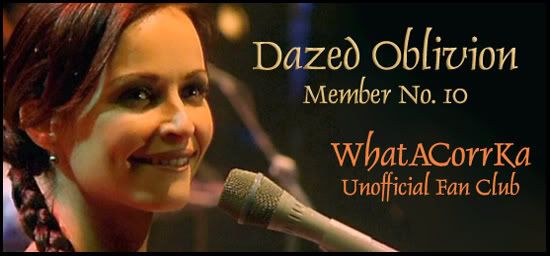Post by DazedOblivion on May 23, 2011 2:24:01 GMT 1
As this thread dealt with some unsolved mysteries regarding Ten Feet High, I thought I would include some information from recent interview in the Telegraph (www.telegraph.co.uk/culture/music/8513201/I-never-wanted-to-sing-again-interview-with-Andrea-Corr.html) in which Andrea reflects on her experience with Ten Feet High.
From the article, she believes in her album made with Nellee Hooper, but feels that the record company did not have faith in it which left her feeling disillusioned about singing.
ANOTHER article in Irish Times (www.irishtimes.com/newspaper/magazine/2011/0521/1224297149876.html) includes the following:
Then there is this section in the article - one that comes with little explanation - and not actually put in quotes, but it is of import:
From the article, she believes in her album made with Nellee Hooper, but feels that the record company did not have faith in it which left her feeling disillusioned about singing.
And, after an unsuccessful solo release left her feeling she never wanted to sing again, she’s recorded a new album.
'After the last record [Ten Feet High, which she released in 2007] I was doing other things. I learnt French just because it’s a beautiful language. I wanted to step out of recording so that I could be enthusiastic about singing again,’ she says.
Ten Feet High was well received – critically, at least. 'Unfortunately, I don’t think it was heard. I suppose you can’t have everything,’ she says.
'I felt that we made a good record. I was happy with it, as was Nellee Hooper [the producer, who also works with Björk, Gwen Stefani and Madonna].
'But I don’t think the record company believed in it. They wished that the record was Andrea-turns-into-Karen-Carpenter as opposed to the record that I did, which was a lot more edgy.
'I have had a lot of commercial success in the past. But this record came out when James Blunt was everywhere,’ she says with a faint shrug. Unlike Blunt’s pining love songs, Ten Feet High was raw and confrontational.
'After that I felt disillusioned. I didn’t even sing in the shower anymore. I lost my…’ She pauses as if she can’t quite put the loss into words. 'I thought, “I’m not going to do anything until I have my enthusiasm back, and if I don’t, I don’t.
'I’m just going to be living my life.”’
But then she met the producer (and Sinéad O’Connor’s ex-husband) John Reynolds, about a year after the release of Ten Feet High, at a tribute record recording for the singer and guitarist of the Dubliners, Ronnie Drew.
'John asked to meet me afterwards,’ she says speaking fast and earnestly. 'He said, “I love your voice and I’d love us to work together. There are some songs this generation hasn’t heard that are amazing.”
'I said, “I only do my own songs,” but he talked more about it and I thought, “Actually, it might be a joy to sing and not have someone asking, 'Where are the hits?’” It was liberating. Total freedom to enjoy singing.’
The songs on the record are all 'songs that helped me do something, or songs I fell in love listening to, or helped me get through a break-up. That’s the wonder of songs, the way they can be a vehicle to a past emotion.’
The album takes its name from a Harry Nilsson song. 'It might sound a bit dramatic but songs can be lifelines.
'You hear something and then you don’t feel so alone, you feel you’re not the only one suffering – so maybe you’ll stay alive another day.’ She laughs a little darkly.
Ten Feet High was well received – critically, at least. 'Unfortunately, I don’t think it was heard. I suppose you can’t have everything,’ she says.
'I felt that we made a good record. I was happy with it, as was Nellee Hooper [the producer, who also works with Björk, Gwen Stefani and Madonna].
'But I don’t think the record company believed in it. They wished that the record was Andrea-turns-into-Karen-Carpenter as opposed to the record that I did, which was a lot more edgy.
'I have had a lot of commercial success in the past. But this record came out when James Blunt was everywhere,’ she says with a faint shrug. Unlike Blunt’s pining love songs, Ten Feet High was raw and confrontational.
'After that I felt disillusioned. I didn’t even sing in the shower anymore. I lost my…’ She pauses as if she can’t quite put the loss into words. 'I thought, “I’m not going to do anything until I have my enthusiasm back, and if I don’t, I don’t.
'I’m just going to be living my life.”’
But then she met the producer (and Sinéad O’Connor’s ex-husband) John Reynolds, about a year after the release of Ten Feet High, at a tribute record recording for the singer and guitarist of the Dubliners, Ronnie Drew.
'John asked to meet me afterwards,’ she says speaking fast and earnestly. 'He said, “I love your voice and I’d love us to work together. There are some songs this generation hasn’t heard that are amazing.”
'I said, “I only do my own songs,” but he talked more about it and I thought, “Actually, it might be a joy to sing and not have someone asking, 'Where are the hits?’” It was liberating. Total freedom to enjoy singing.’
The songs on the record are all 'songs that helped me do something, or songs I fell in love listening to, or helped me get through a break-up. That’s the wonder of songs, the way they can be a vehicle to a past emotion.’
The album takes its name from a Harry Nilsson song. 'It might sound a bit dramatic but songs can be lifelines.
'You hear something and then you don’t feel so alone, you feel you’re not the only one suffering – so maybe you’ll stay alive another day.’ She laughs a little darkly.
ANOTHER article in Irish Times (www.irishtimes.com/newspaper/magazine/2011/0521/1224297149876.html) includes the following:
After being used to everything she touched with The Corrs turning to gold, the solo-album affair hardened her up a bit. “I was innocent and naive enough to think it would all go my way,” she says. “I was disillusioned because of the duplicity [of the record label]. They’d be there in the studio – the guys who wear runners under their suits – saying, ‘I love it. That’s a smash hit!’ but they didn’t like it and they were pushing other acts instead of me. There was no radio play, no TV play. They had no conviction in it. I had made a record they didn’t want. I just thought: ‘I’m not going to sing again.’ I was jaded and disappointed. I took up learning French so that whenever anyone asked me what I was doing I could say: ‘Me? Oh, I’m busy learning French.’ ”
Then there is this section in the article - one that comes with little explanation - and not actually put in quotes, but it is of import:
She lives in a flat in west London with her husband. She’s still close to the other Corrs but there’s unlikely to be a revival.


